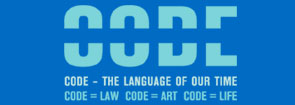| |
|
|
|
|
||
|
||||||||||||||||||||
| |
|
|
|
|
 |
|
 |
|||
| |
||||||||||
| |
||||||||||
 |
|
|||||||||
| |
||||||||||
| |
||||||||||
| |
||||||||||
| |
|
Cindy Cohn at CODE Symposium
Cindy Cohn (USA), the Legal Director for the Electronic Frontier Foundation, on seven ways in which code equals law - and one in which it does not … "Code equals law:" what might this statement mean? As our laws and our computers become increasingly intertwined, clear thinking about the relationship between code and law becomes increasingly important. In the early days of the Internet, many computer programmers were convinced that code would make law irrelevant. More recently we’ve seen legislators, regulators and judges who seem convinced that law can and should dictate code. Neither absolutist view is likely to prevail—virus writers go to jail and DeCSS is still available worldwide—but maybe by exploring the connections between the two concepts we can see how each can teach the other something. In addition, perhaps we can learn a few things about how both can help us create and preserve freedom as we move deeper into the digital era. 1. A first connection between the two words comes straight out of the dictionary. The Oxford English Dictionary says that a code is "[a] systematic collection or digest of the laws of a country." From the Code Napoléon to the California Motor Vehicle Code, lawyers are more than comfortable with the idea that the contents of a "code" constitute "law." Taken literally, then, the first way "code equals law" is a tautology, because "code" is defined to mean "law". 2. A second meaning for "code equals law," might be a kind of pun: computer code is nothing more or less than legal code transplanted to the electronic realm. 3. A third meaning of "code equals law" is as a reminder that law is a kind of code, that lawyers can learn from the insights of programmers into the design process. 4. The missing link between "computer code" and "legal code" is "secret code." The common theme here is linguistic: codes are written systems of communication. 5. A fifth sense in which "code equals law" would be that, increasingly, code is the subject of law. Code is speech is one of the first of those. But with code penetrating so much of society, more and more laws and legal decisions will become decisions about code. 6. A sixth interpretation of the claim that "code equals law" would say that the statement is false, because while a code is a kind of law, "law" embraces much more than just "code." 7. Code determines what you can and can’t say in an email message; what your computer will and won’t do; who can see your web page, and how. Code allows some things and forbids others. It makes possible all of the new virtual spaces and new forms of interaction we associate with the Internet and other technologies, but it also lays down rules for those spaces, puts limits on what forms those interactions are allowed to take. 8. An eighth and final meaning of "code equals law:" as code takes on the powers of law, it must also take on the responsibilities of law. Lawyers today are learning about code and they can benefit much from this knowledge, but coders will also need to become lawyers, in the best sense of the term, if we are to preserve freedom online and build the kind of digital world where we all want to live. (Excerpts of the Ars Electronica catalog text) |  |
|
||||||
| |
||||||||||
| |
Ingrid Fischer-Schreiber |
|||||||||
| |
 |
|||||||||
| © Ars Electronica Linz GmbH, info@aec.at | ||||||||||